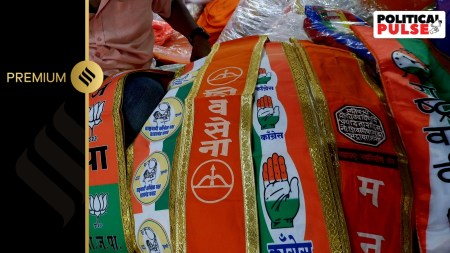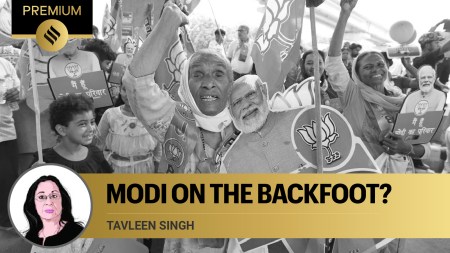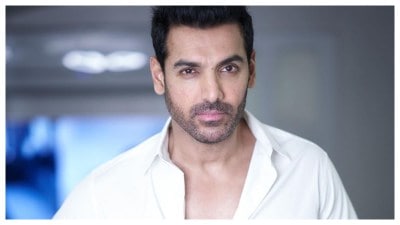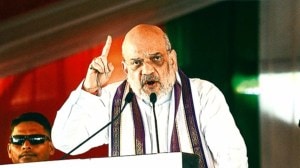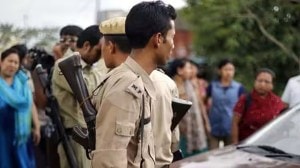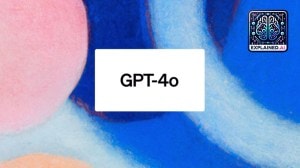- India
- International
Eye on China, India and France focus on defence, maritime ties
The two sides also signed a new confidentiality agreement, replacing the 2008 pact, that shields government from sharing classified information on defence deals, including the Rafale fighter aircraft deal.
 PM Narendra Modi with French President Emmanuel Macron and his wife Brigitte Macron in New Delhi on Saturday. (Express Photo by Praveen Jain)
PM Narendra Modi with French President Emmanuel Macron and his wife Brigitte Macron in New Delhi on Saturday. (Express Photo by Praveen Jain)
Stepping up strategic cooperation — with China in mind — India and France on Saturday signed a pact that will enable their defence forces to access each other’s facilities and extend logistical support on a reciprocal basis. The deal, which is similar to the logistical support pact with the US, is an indicator of the strategic depth and maturity in defence ties between the two countries.
“I consider today’s agreement on the reciprocal logistics support between our armies as a golden step in the history of our close defence cooperation,” Prime Minister Narendra Modi said, after bilateral talks with visiting French President Emmanuel Macron.
Signed by Defence Minister Nirmala Sitharaman and French Armed Forces Minister Florence Parly, the pact will facilitate reciprocal provision of logistics support, supplies and services between the armed forces of the two countries during authorised port visits, joint exercises, joint training, humanitarian assistance and disaster relief efforts.
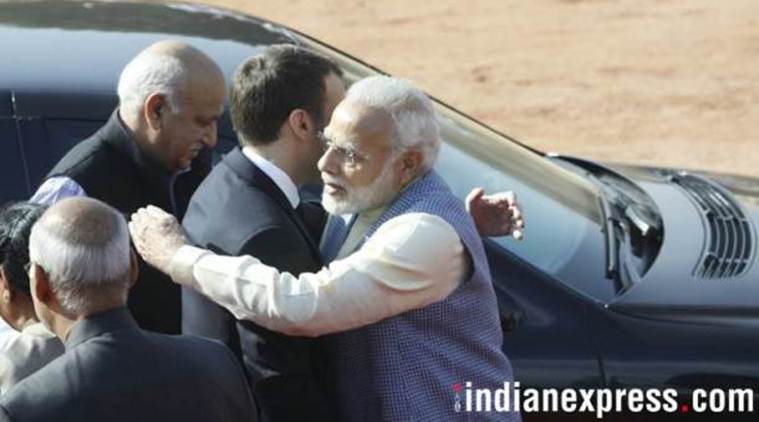 French President Emmanuel Macron arrived in India on Friday night. Prime Minister Narendra Modi, in a departure from protocol, welcomed him at the Air Force Station Palam in Delhi. (Express Photo by Praveen Jain)
French President Emmanuel Macron arrived in India on Friday night. Prime Minister Narendra Modi, in a departure from protocol, welcomed him at the Air Force Station Palam in Delhi. (Express Photo by Praveen Jain)
The two sides also signed a new confidentiality agreement, replacing the 2008 pact, that shields government from sharing classified information on defence deals, including the Rafale fighter aircraft deal. Signed between NSA Ajit Doval and French President’s diplomatic advisor Philippe Etienne, the pact is about the exchange and reciprocal protection of classified or protected information.
ALSO READ | Indian, French companies sign pacts worth 13 billion euros

Stressing that defence cooperation between the two countries now has a “new significance”, Macron said, “India had made a sovereign decision in this respect (Rafale fighter jet) and we are monitoring the progress in the field. We very much want to continue the programme. It is a long-term contract which is mutually beneficial. I personally consider it as the heart of the strategic partnership.”
The two countries also agreed to create an annual defence dialogue at the ministerial level. “Our defence cooperation is very strong and we consider France among the most trusted defence partners,” said Modi.
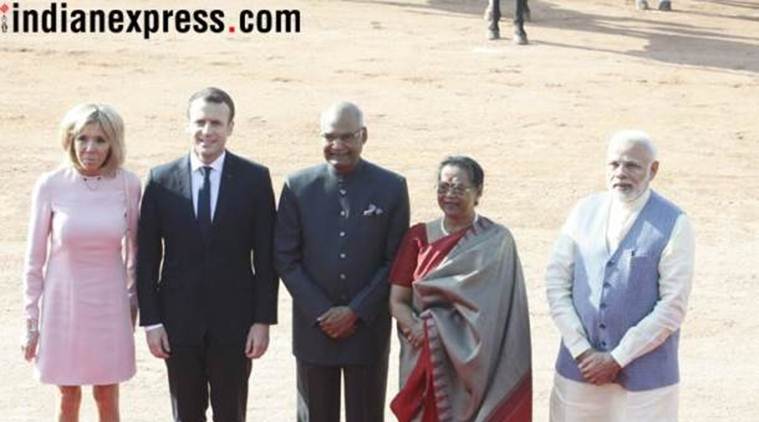 President of France, Emmanuel Macron and First Lady Brigitte Macron received by President Ram Nath Kovind and Savita Kovind with PM Narendra Modi. (Source: Express Photo)
President of France, Emmanuel Macron and First Lady Brigitte Macron received by President Ram Nath Kovind and Savita Kovind with PM Narendra Modi. (Source: Express Photo)
On the government-to-government deal with France in 2016 to buy 36 Rafale fighter jets for about Rs 58,000 crore, the joint statement said the two leaders noted with satisfaction the “on-schedule progress” in the implementation of acquisition related agreements, including the Rafale aircraft agreement signed in 2016.
The two sides also made common cause on maritime security, as they signed a joint strategic vision on the Indian Ocean Region to counter more proactive and assertive Chinese activities in the area.
“Both of us believe that in future, the Indian Ocean Region will play a very important role in the happiness, progress and prosperity of the world. Whether it is the environment, or maritime security, or marine resources, or the freedom of navigation and overflight, we are committed to strengthening our cooperation in all these areas. And therefore today we are releasing a joint strategic vision for our cooperation in the Indian Ocean area,” said Modi.
The two leaders carefully avoided mentioning Indo-Pacific in their statements. While the January 2016 joint statement with then French President Francois Hollande put emphasis on countering terrorism, the focus, this time, was on maritime security in the Indian Ocean Region and defence cooperation.
 President of France, Emmanuel Macron and First Lady Brigitte with PM Narendra Modi in New Delhi. (Source: Express Photo)
President of France, Emmanuel Macron and First Lady Brigitte with PM Narendra Modi in New Delhi. (Source: Express Photo)
On maritime security, the French President said both the countries will have “unprecedented” level of cooperation to ensure peace and stability in the Indian Ocean and Pacific. He said space agencies of both countries will have a joint monitoring mechanism for developments in the maritime sphere, while the two Navies will share intelligence and call their respective military bases for any requirement.
Recalling the importance of the Varuna bilateral exercise initiated in 1983, India and France agreed to enhance inter-operability between the two Navies. Its next edition, to be held in the Indian Ocean this year, will focus on “submarine and anti-submarine warfare as well as combating maritime terrorism” — as Chinese submarines have been passing through Indian Ocean regularly.
The joint statement said they welcomed the “Joint Strategic Vision of India-France Cooperation in the Indian Ocean Region”, as a “guiding beacon” for such partnership. “The leaders reiterated that this cooperation will be crucial in order to maintain the safety of international sea lanes for unimpeded commerce and communications in accordance with the international law, for countering maritime terrorism and piracy, for building maritime domain awareness, for capacity building and for greater coordination in regional/ international fora in the region,” said the statement, using the internationally-accepted language for China’s presence in South China Sea.
On the much-delayed Jaitapur nuclear power project, the two leaders reiterated the goal of commencing work at the Jaitapur site “around the end of 2018”, and encouraged NPCIL and EDF to accelerate the contractual discussions in that respect. They signed an agreement which prescribes a way forward for implementation of the project.
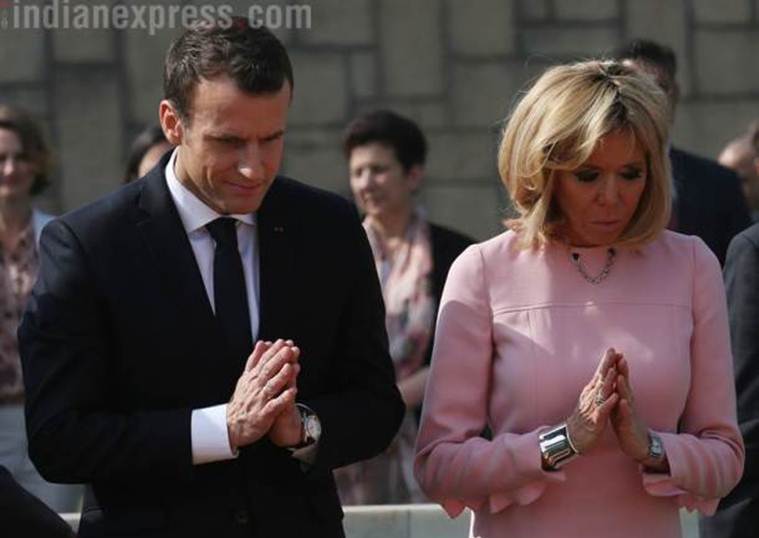 French President Emmanuel Macron and First Lady Brigitte Macron pay floral tribute at Mahatma Gandhi’s memorial Rajghat in New Delhi, on Saturday. (Express Photo/Amit Mehra)
French President Emmanuel Macron and First Lady Brigitte Macron pay floral tribute at Mahatma Gandhi’s memorial Rajghat in New Delhi, on Saturday. (Express Photo/Amit Mehra)
Once installed, the Jaitapur project will be the largest nuclear power plant in the world, with a total capacity of 9.6 GW. It will contribute to achieving India’s goal of 40 per cent non-fossil energy by 2030.
In this context, the joint statement emphasised the need for the project to generate “cost-effective electricity; economical and competitive financing package from the French side; reliable, uninterrupted and continued access to guaranteed fuel supply for the lifetime of the Jaitapur nuclear power plants; and collaboration on transfer of technology and cost-effective localisation efforts of manufacturing in India. The latter includes transfer of rights on technology to be mutually agreed”.
They welcomed the understanding shared by the two parties on the enforcement of India’s rules and regulations on civil liability for nuclear damages applicable to the Jaitapur project.
India and France also called upon all countries to work towards rooting out terrorist safe havens and infrastructure, disrupting terrorist networks and their financing channels, and halting “cross-border movement of terrorists” like Al Qaeda, Daesh/ISIS, Jaish-e-Mohammed, Hizbul Mujahideen, Lashkar-e-Taiba, and their affiliates as well as terrorist groups threatening peace and security in South Asia and the Sahel region.
As France had played an active role in grey-listing Pakistan at the FATF last month, the two leaders agreed to strengthen counter-terrorism in multilateral fora such as the UN, GCTF, FATF and G20. They called upon all UN member countries to implement the UNSC Resolution 1267 and other relevant resolutions designating terrorist entities, said the joint statement, in a reference to the global listing of Jaish-e-Mohammad chief Maulana Masood Azhar.
Macron said that effectively containing threats of terrorism and radicalisation are going to be key elements in the strategic cooperation between the two countries. Mentioning the threat of “Islamist terrorism” in particular, he said, “the trust that we share is protecting us as our interests are aligned.
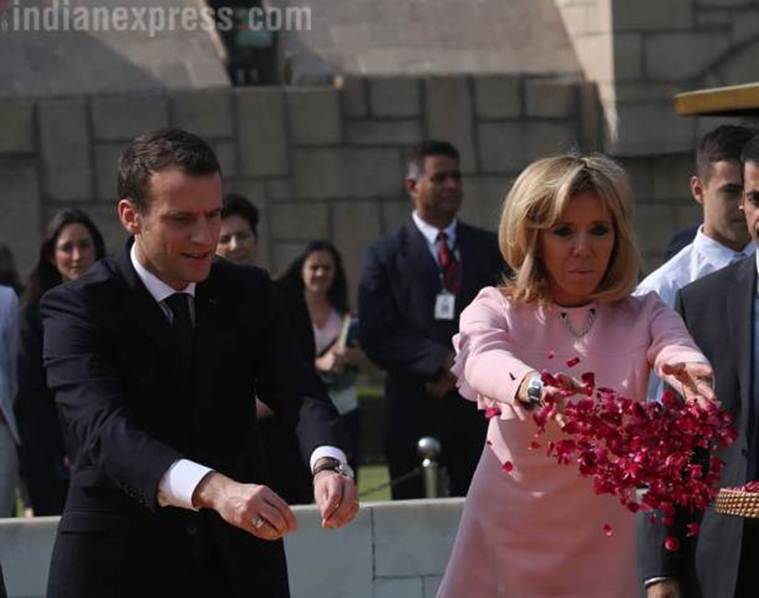 French President Emmanuel Macron and First Lady Brigitte Macron pay floral tribute at Mahatma Gandhi’s memorial Rajghat in New Delhi, on Saturday. (Express Photo/Amit Mehra)
French President Emmanuel Macron and First Lady Brigitte Macron pay floral tribute at Mahatma Gandhi’s memorial Rajghat in New Delhi, on Saturday. (Express Photo/Amit Mehra)
The joint statement also had a reference to China’s One Belt One Road project. The two sides underlined that “connectivity initiatives must be based on key principles of international norms, good governance, rule of law, openness, transparency; follow social and environmental standards, principles of financial responsibility, accountable debt-financing practices; and must be pursued in a manner that respects sovereignty and territorial integrity,” it said. The reference to “sovereignty and territorial integrity” is clearly aimed at the China-Pakistan Economic Corridor which is being opposed by India.
In all, India and France inked 14 pacts in key areas of defence, security, nuclear energy and protection of classified information, as well as cooperation in other areas including railways, environment, solar energy, maritime awareness and checking trafficking of narcotic drugs and psychotropic substances.
May 15: Latest News
- 01
- 02
- 03
- 04
- 05






